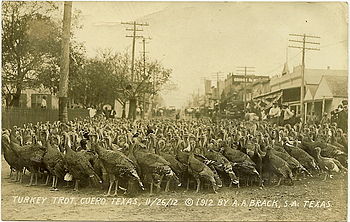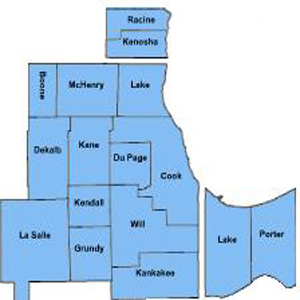Corage: Family Togetherness, or, How to Make It Through the Thanksgiving And Emerge Stronger on the Other Side
A quick primer on how to get through Thanksgiving with family. And no, family togetherness doesn’t mean you need to fight all the time.
By Sally Eames
Over the course of my work with clients, the conversation at some point invariably shifts to a focus on frustrating points in relationships.
“I’m struggling with an issue that’s come up with my [insert role].”
And then they talk about how distressed they are by the situation. My standard answer is, “I can’t coach them. They’re not here. But I can coach YOU. How do you want to be in this situation? How might you show up differently to make things different for yourself? What parts of this situation can you control and affect?”

Sometimes, Thanksgiving with the family is like walking through a rafter of turkeys (Photo credit: Wikipedia)
This week, people all over the United States are planning to gather and celebrate Thanksgiving and, as a result, there will be uncomfortable encounters. That’s what happens in families, in communities. We can’t get along with everyone. In many instances people are already dreading the upcoming interactions, where old patterns and relationships come into play.
As I said, I can’t coach the other person. But I can offer YOU some suggestions for getting through the less delightful parts of your holiday celebrations and coming out empowered on the other side:
- Remember that it’s probably not about you. Believe it or not, other people are usually focusing on their own insecurities or fears or needs when they behave badly. They’re rarely thinking about everyone else who has to deal with it. Even when you’re the chosen target for hypercritical comments or disparaging remarks, it’s not really about you. So take a deep breath when that stuff happens, and remember how wonderful you really are. And then go spend time with someone who will tell you so.
- Apologize when you need to. What parts of this situation do you have responsibility for? Be honest. It may not be pleasant to admit you share some of the burden here, but it’s an important part of being in integrity with yourself. Do you owe someone an apology? What behaviors/disruptive narratives/assumptions of your own are getting in the way?
However:
- You don’t have to clean up other people’s messes. We’re not talking about the table or the dishes. Helping with cleanup is always a good idea after dinner. But it’s not your responsibility to fix anyone else. You can grieve losses with them, and you can comfort them when they’re hurting. However. They’re the only people who can decide when fixing is needed and how that’s going to happen. As I said to a client this week, “When we continue to carry other people’s baggage for them, they have no need to pay attention to how much luggage they’re hauling around.”
- Forgive the things that have been done to you in the past. Forgiveness is AWESOME. Why? Because you’re actually doing it for YOURSELF. When you forgive someone for hurts they’ve caused you (even if you never tell them you’ve done so), you are choosing to let go of that pain. Until you forgive, you’re carrying it around with you and re-inflicting the hurt every time you remember it. Forgiveness is deciding you don’t need to experience that pain any more.
Or, consider trying:
- Don’t go there. Forgiveness doesn’t mean you walk right back into the same hurtful situations. If someone is dangerous or consistently works to cause you pain, you have every right to decide to not have anything to do with them. You don’t have to be with unhealthy people just because they’re “family.”
- Use a filter. One of my clients has coined a beautiful term for the way to separate the good people they love from the ways they sometimes behave. They remember that there’s a person in there, trying their best, “trapped in a cloud of bullshit.” Recognizing the difference between the person and the bullshit allows us to be more accepting and forgiving of the frail and flawed humans we love.
Ultimately, this is all about setting and enforcing your boundaries, about knowing who you are and where your edges live, and recognizing the need to keep self and borders intact, without emotional incursions into anybody else’s territory.
What tactics do you use to head off trouble and have happy holidays?
Sally Eames, CPCC, ACC operates Corage Coaching. She is a Certified Professional Co-Active coach and a graduate of the Coaches Training Institute. She is also an International Coach Federation Associate Certified Coach. For the full text of this column, please visit her blog. For more information on her work as a Co-active coach, please visit her site at havecorage.wordpress.com.
Justin Shimko is an award-winning writer and political analyst. He began as a reporter in his college days at the University of Oklahoma, writing for The Oklahoma Daily (rated as one of the best collegiate newspapers in the nation) and The Oklahoman, the statewide newspaper, winning awards from the CSPA and the Society of Professional Journalists. He later moved on to research and writing work for a number of political campaigns. His email is
[email protected]
Latest posts by Justin Shimko (see all)
Related
 Blog Posts
Blog Posts






Corage: Family Togetherness, or, How to Make It Through the Thanksgiving And Emerge Stronger on the Other Side
A quick primer on how to get through Thanksgiving with family. And no, family togetherness doesn’t mean you need to fight all the time.
By Sally Eames
Over the course of my work with clients, the conversation at some point invariably shifts to a focus on frustrating points in relationships.
“I’m struggling with an issue that’s come up with my [insert role].”
And then they talk about how distressed they are by the situation. My standard answer is, “I can’t coach them. They’re not here. But I can coach YOU. How do you want to be in this situation? How might you show up differently to make things different for yourself? What parts of this situation can you control and affect?”
Sometimes, Thanksgiving with the family is like walking through a rafter of turkeys (Photo credit: Wikipedia)
This week, people all over the United States are planning to gather and celebrate Thanksgiving and, as a result, there will be uncomfortable encounters. That’s what happens in families, in communities. We can’t get along with everyone. In many instances people are already dreading the upcoming interactions, where old patterns and relationships come into play.
As I said, I can’t coach the other person. But I can offer YOU some suggestions for getting through the less delightful parts of your holiday celebrations and coming out empowered on the other side:
However:
Or, consider trying:
Ultimately, this is all about setting and enforcing your boundaries, about knowing who you are and where your edges live, and recognizing the need to keep self and borders intact, without emotional incursions into anybody else’s territory.
What tactics do you use to head off trouble and have happy holidays?
Sally Eames, CPCC, ACC operates Corage Coaching. She is a Certified Professional Co-Active coach and a graduate of the Coaches Training Institute. She is also an International Coach Federation Associate Certified Coach. For the full text of this column, please visit her blog. For more information on her work as a Co-active coach, please visit her site at havecorage.wordpress.com.
Justin Shimko
Latest posts by Justin Shimko (see all)
Share this:
Related